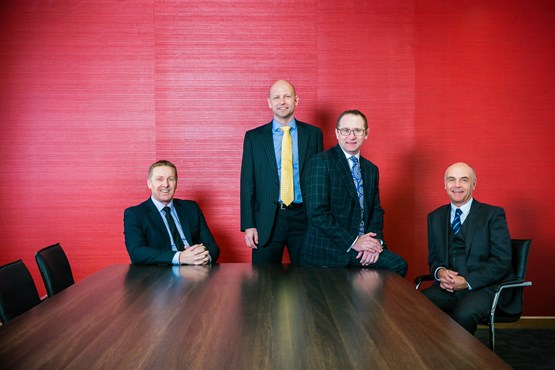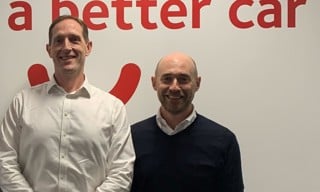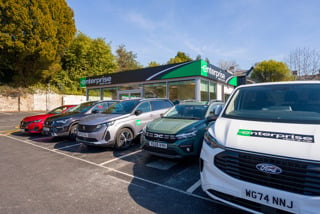offi
In a leasing landscape dominated by bank and manufacturer-owned contract hire companies, private equity-owned Tusker is plotting a course for success.
It has trebled its risk fleet in the past 10 years and over the past three years has reported year-on-year increases in excess of 20%.
It’s a rate of growth that has only been bettered in the FN50 by acquisition and has propelled Tusker from a top 40 leasing company to one well inside the top 20.
Last year’s risk fleet of 12,201 cars and vans now stands at 14,500 and the company is conservatively predicting in excess of 26,000 units by 2018.
Growth will predominately come from salary sacrifice, but chief executive officer David Hosking also expects the contract hire fleet to double over the same period.
That’s despite what he describes as a “pretty flat” company car parc. “The growth that seems to be coming out of the top of the FN50 is predominantly from the SME and broker sectors – and that’s a race to the bottom," says Hosking.
“The companies that are doing well in the traditional contract hire space are stealing it off the companies that aren’t doing so well.
“The one shining light in the fleet market at the moment in terms of growth is salary sacrifice and, as more companies realise its benefit, it will become the norm.
Factfile
Chief executive officer: David Hosking
Chief operations officer: Mark Sinclair
Chief commercial officer: Iain Carmichael
Chief financial officer: David Brockwell
Risk fleet: 14,500
Turnover: £100m-plus
Headquarters: Watford
“When we started doing it, back in 2008, we had to educate the market as much as sell the concept; we’re not having to do that now.”
Currently, around a quarter (24%) of Tusker’s risk fleet is contract hire, with the remaining 11,000 units provided via salary sacrifice.
The company is the largest salary sacrifice provider, with research suggesting a market share of around 20%. And, as penetration rates increase with existing customers while new ones are brought on board, it’s not difficult to understand why Hosking is expecting the significant growth seen in the past few years to continue.
He explains: “If we go back two years, we launched salary sacrifice schemes to around about 60,000 eligible employees.
“Last year, we launched salary sacrifice schemes to 135,000 eligible employees and, in the first five months of this year, we’ve already hit 120,000. This is a growing marketplace and those numbers do nothing but confirm that.”
Tusker has 220 live schemes, offering salary sacrifice to 500,000 eligible employees from a customer base which includes National Grid, Telegraph Media Group, Northumbrian Water and Airbus.
There is an equal split between the public and private sectors, while its eligible employees are closer to 65:35 in favour of the public sector.
However, half a million employees won’t all choose to take a car via salary sacrifice, and penetration levels will vary.
“If you look at local authorities, where you have quite a large number of employees pretty close to national minimum wage, you’ll not get the same penetration rates as you would in a well-paid public sector environment such as the ambulance service or police,” says Hosking.
“Success is a penetration rate in double figures after three years, and some of our longer-term schemes of up to four, five or six years are well into double figures at 15 or 16%.”
However, that requires an approach which is markedly different from sealing a traditional multi-vehicle, fleet leasing deal. As Iain Carmichael, chief commercial officer at Tusker, explains: “We bespoke our proposition to each and every customer.
“We will put a thorough pre-launch plan in place and then follow that up in perpetuity, so every year we will have a scheme awareness programme and a marketing plan in place.
“Customers expect a retail experience, because for them it’s either a used car from the local dealer or PCP and driver satisfaction is also key, because it helps with the ongoing success of the scheme.”
If Tusker was to achieve a 10% penetration rate on its existing customer base, it would have a risk fleet of 50,000 vehicles within the next three years. It puts its aim of doubling its risk fleet, within the same timeframe, to just over half that figure in perspective.
However, Tusker predicted similar significant growth three years ago, telling Fleet News it expected to have 20,000 units by the end of 2014.
Hosking says: “In hindsight, that was an internal target and we should have kept in internal.”
The company had been challenged by the then chairman, Trevor Chinn, to think above and beyond what it expected to achieve.
Hosking explains: “Our budget before we were challenged was 12,000 vehicles, which we more than achieved.
“However, 26,000 by the end of 2017 is our target; that’s the management team’s prediction of what we will deliver over the next three years.
“That’s not a new chairman’s target telling us that’s what we need to achieve.
“To put that in perspective, we have a target this year of 8,500 funded orders; we’re on target to deliver that and we’re just five and half months in.
“And, even if we just continue as we are right now over the next three years, we will get to that number.”
Tusker will be helped in its quest for growth by the financial clout of new private equity backer ECI Partners (fleetnews.co.uk, February 19).
UK-based ECI specialises in investments with high-growth companies valued between £20m and £150m. Its current investments include industrial design, professional services, finance and travel.
“Our previous investor Smedvig had been with us a long time; they started out with us in the beginning, back in 2000,” says Hosking.
“As an investor, there’s usually a start, middle and an end, and that lasts over a three to five-year period. I guess that they thought 2015 was a good time for an end.”
Smedvig is a start-up type investor, with a typical investment of £2-10m, and Tusker had grown to such an extent that it represented the vast majority of its portfolio.
Being more of a mid-market player, EPI’s typical investment is £50-150m, so its typical equity cheque will be anywhere between £20-80m.
That puts Tusker in the ‘sweet spot’ for future investment and access to an investor with deeper pockets to help it achieve its growth ambitions.
Tusker's ethos and the elephant manifesto
Almost a third of drivers who take a car on salary sacrifice say the deciding factor was personal recommendation.
It’s no surprise, then, that Tusker puts so much weight on customer service and, as David Hosking puts it, “going the extra mile”.
“It pays dividends – it’s much better to have advocates than detractors,” he says. “We have a very can-do culture here; a very inclusive culture, so everybody in the business knows what’s going on.”
It’s an ethos that is literally spelt out in an internal document called the ‘Elephant Manifesto’.
“It’s basically the bible by which we want everybody here to deal with our customers,” explains Hosking. “It’s about doing the right thing; it’s about getting the job done and having a can-do attitude; it’s not something we pay lip service to. This is something that’s indoctrinated into people as part of the induction process.”
Its commitment to customer service is only matched by its commitment to the environment. Carbon emissions for every new car added to its salary sacrifice fleet are offset at the company’s own expense, while a microsite promotes the cost savings and environmental benefits of ultra-low emission vehicles to all Tusker drivers.
It has also moved into new energy-efficient offices which have a target of zero waste and 100% recycling of materials, plus on-site food composting, cardboard bailing and rainwater harvesting.





















Login to comment
Comments
No comments have been made yet.